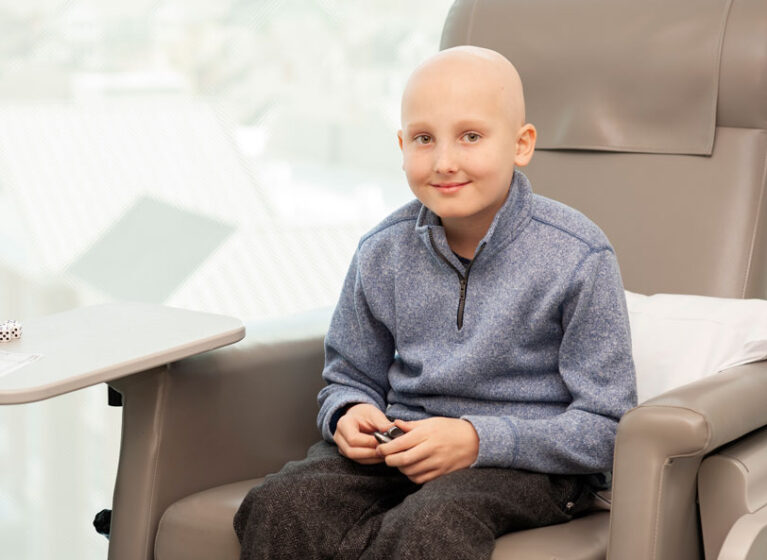
Families facing a childhood cancer diagnosis want the best program available. Money, distance, and other concerns play a role, but what every parent values most is their child’s health.
As part of the Children’s Oncology Group (COG), UVA Health Children’s pediatric oncology department offers the same gold standard of care as larger children’s hospitals. But, additionally, we can offer a few major advantages for families in Virginia.
Gold Standard Care
Our teams’ skills allow us to provide a high standard of care. From trained pediatric neurosurgeons who can remove dangerous tumors to immunotherapy experts who are curing previously incurable diseases, our varied expertise allows us to meet the needs of every child.
In our region, we're the only pediatric cancer program that has offered both FDA-approved and clinical trial options for CAR T-Cell treatment. Since 2017, when we treated our first pediatric patient with this immunotherapy, we’ve continued to expand the applications and our ability to provide exceptional care through this therapy.
For patients who rely on chemotherapy, we have a pediatric infusion center designed with children’s needs at the forefront. But, when appropriate, we can also help train parents to provide their child’s chemotherapy at home, allowing for family-centered care that preserves their time together and lets patients be as comfortable as possible.
In all of our treatments, we work to balance efficacy and effectiveness, preserving both quantity and quality of life for our patients.
A Core Care Team You Can Count On
Top children’s hospitals around the United States, including UVA Health Children’s, participate in the COG. This group collaborates and shares data and treatment best practices. No matter which hospital in the COG a child is seen at, they’ll provide the very best in evidence-based medicine.
But many of our patients say what they love most about treatment at UVA Health Children’s is the consistency of their care team. Having doctors, nurses, and other care team members who know a child as an individual means they know how to meet that child’s and family’s needs.
Michael Engel, MD, PhD, chief of pediatric hematology/oncology here, views that as the department's mission. “Our patients and families are entitled to receive exemplary, cutting-edge care close to home. They should also feel cared for while it happens.”
This continuity of care creates opportunities for both medical supports and emotional ones. There are countless stories of this that come from our hospital.
A chemotherapy nurse advocated for a solution to a 5-year-old’s cyclical fevers and also took the time to learn her favorite colors and cartoon characters. Her family said this care was part of what allowed this young girl to be brave and fight.
Our stem cell transplant team dressed in camo, their patient’s favorite, to show how much they supported him. “He loves hunting, camping, and being out in the woods,” Daniel “Trey” Lee, MD, shared. “Our goal is to meet each patient’s individual needs rather than provide just one cookie-cutter type of experience.”
A Support Network Near You
Going through cancer can make anyone feel isolated. And for children, even short bursts of isolation can feel way too long. Connecting with other families nearby who have gone through the same battle and understand their struggles can help them feel understood.
UVA Health Children’s offers a variety of ways that families can stay connected to each other while going through treatment and recovering.
Local non-profits, like The Alyssa House and Yellow Door Foundation, offer long-term lodging as available for the families of immunocompromised patients who need to be close to the hospital for treatments. Coupled with the walkability people associate with college-centered towns, for many, it’s a much more comfortable stay than a larger city would provide. That also makes it easier to support each family.
Connecting the Pieces
For many kids, school can be stressful during and after treatment. We have an education navigator who helps patients and their families with their school needs.
Acting as a liaison between the school and the medical team, the navigator can help children reenter school successfully. That can include coordinating:
- Homebound services
- Healthcare plans
- Educational supports
It can also include tailored support for each child, like talking to families and children about what to expect, talking to classmates, and sharing best practices with teachers. This educational support is just one of the many services UVA Health Children’s provides that creates a culture of caring.
Referring to UVA Health Children’s Pediatric Cancer Department
Children with cancer deserve treatment that’s tailored to them, evidence-based, and informed by the largest research group dedicated to pediatric cancer. Thanks to the efforts of the Children's Oncology Group’s participating organizations, including UVA Health Children’s, cure rates for children with cancer now exceed 80%, with improvements being made every day.
With access to local resources, we can help your patients stay connected, feel supported, and enjoy life after survival.